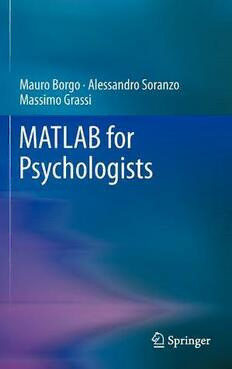
MATLAB for Psychologists PDF
Preview MATLAB for Psychologists
MATLAB for Psychologists Mauro Borgo Alessandro Soranzo ● Massimo Grassi MATLAB for Psychologists Mauro Borgo Alessandro Soranzo Via Marosticana 168 School of Social Science & Law Dueville (VI), Italy University of Teesside Middlesbrough, UK Massimo Grassi Department of General Psychology University of Padova Padova, Italy ISBN 978-1-4614-2196-2 e-ISBN 978-1-4614-2197-9 DOI 10.1007/978-1-4614-2197-9 Springer New York Dordrecht Heidelberg London Library of Congress Control Number: 2012931943 © Springer Science+Business Media, LLC 2012 All rights reserved. This work may not be translated or copied in whole or in part without the written permission of the publisher (Springer Science+Business Media, LLC, 233 Spring Street, New York, NY 10013, USA), except for brief excerpts in connection with reviews or scholarly analysis. Use in connection with any form of information storage and retrieval, electronic adaptation, computer software, or by similar or dissimilar methodology now known or hereafter developed is forbidden. The use in this publication of trade names, trademarks, service marks, and similar terms, even if they are not identifi ed as such, is not to be taken as an expression of opinion as to whether or not they are subject to proprietary rights. Printed on acid-free paper Springer is part of Springer Science+Business Media (www.springer.com) To my three women: my wife, Tatiana, my mother, Angelina, and my grandmother Emilia –Mauro Borgo To my father –Alessandro Soranzo To Viola and Ruggero –Massimo Grassi Preface Psychological researchers should possess several skills, and one of them is surely creativity. Creativity is needed at several key points of the research process, such as in creating experimental stimuli and planning and designing an experiment. Creativity drives good data analysis, so that numbers can reveal their full potential. Much of this creativity is now expressed through a computer program. For exam- ple, in planning and designing a psychological experiment and in analyzing data, we use specifi c software that has been dedicated to that particular job. This software might, however, be a hindrance to creativity, preventing it from permeating research. This is because in the majority of cases, software is designed to satisfy the average user and it is not fl exible enough to meet specifi c needs. In this sense, MATLAB is exactly the other side of the coin. When we fi rst open the software, the lack of a graphical interface may be frustrating: at a fi rst glance, the program may seem diffi cult to use. This book is aimed at helping users in their fi rst approaches to this software, to aid them in programming their psychological experiments and consequently in liberating their creativity. And this is MATLAB’s major advantage: we do not have to adapt our needs to the software; it is the soft- ware that adapts to our needs. MATLAB is an extremely powerful research tool. By means of this single soft- ware tool we can control every step of our research. We can create stimuli of any kind (e.g., pictures, sounds), and we can program psychological experiments, calcu- late statistics, run simulations, and do any kind of signal or biosignal processing. In brief, the fl exibility of this software lets us to control and customize every con- ceivable step of our research requiring a computer program. Moreover, knowledge of MATLAB will help you to fi nd a postdoc in experimental psychology after com- pleting the Ph.D. In many cases, research groups look for researchers with good MATLAB programming skills. The current text is written to help the newcomer in using MATLAB for research in experimental psychology. However, the content can be transferred to any applica- tion. The reader can fi nd the scripts written in this book at the following web page: http://www.psy.unipd.it/~grassi/matlab_book.html vii viii Preface A fi nal recommendation for the reader: do not begin to work with MATLAB without a goal. Our teaching experience suggests that having a goal greatly acceler- ates your learning. Therefore, think immediately about the amazing custom code you need to complete your state-of-the-art research. That code is here in this book, waiting to be written by you. Dueville (VI), Italy Mauro Borgo Middlesbrough, UK Alessandro Soranzo Padova, Italy Massimo Grassi Acknowledgments Thanks to Professor Silvano Pupolin for his support. ix
